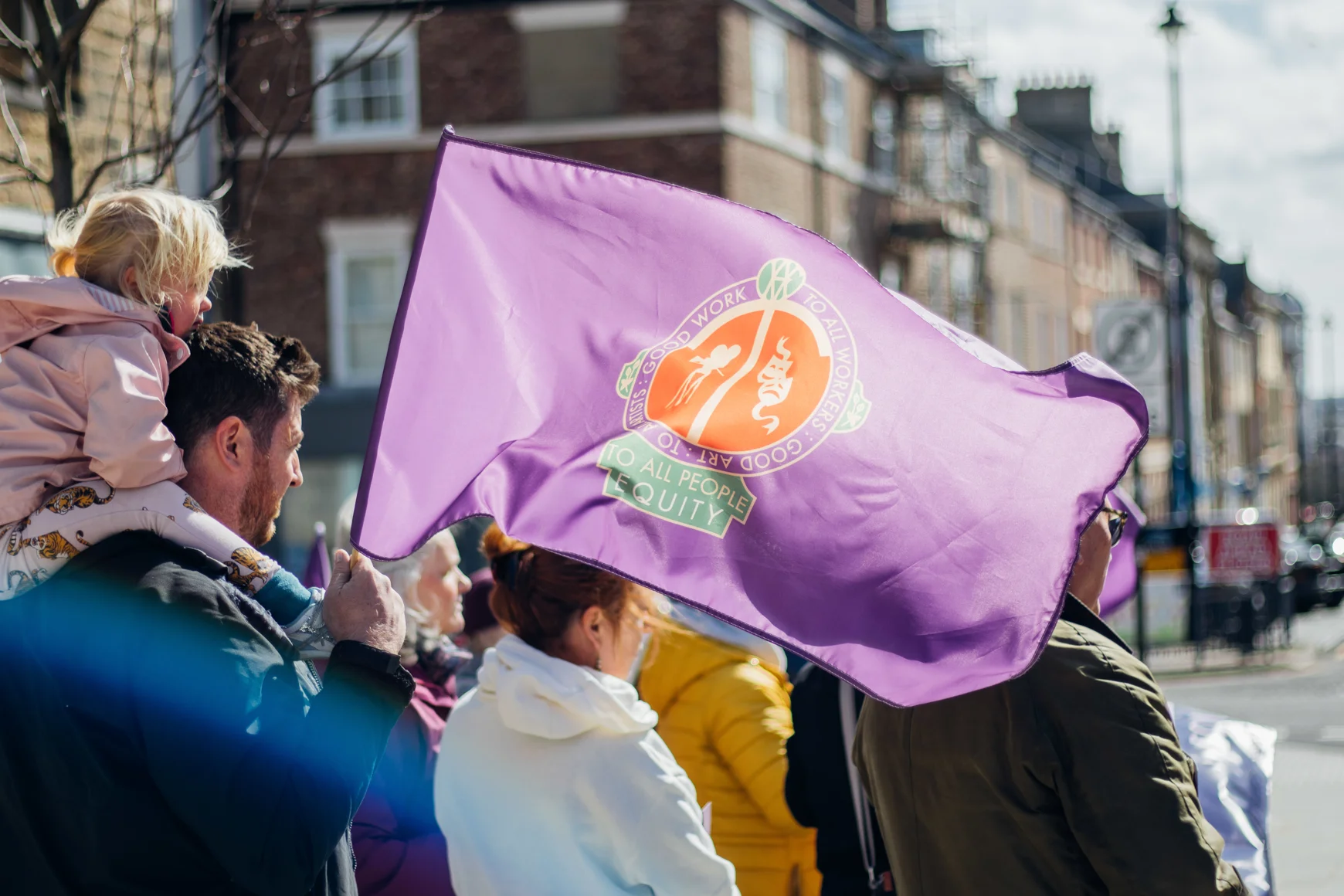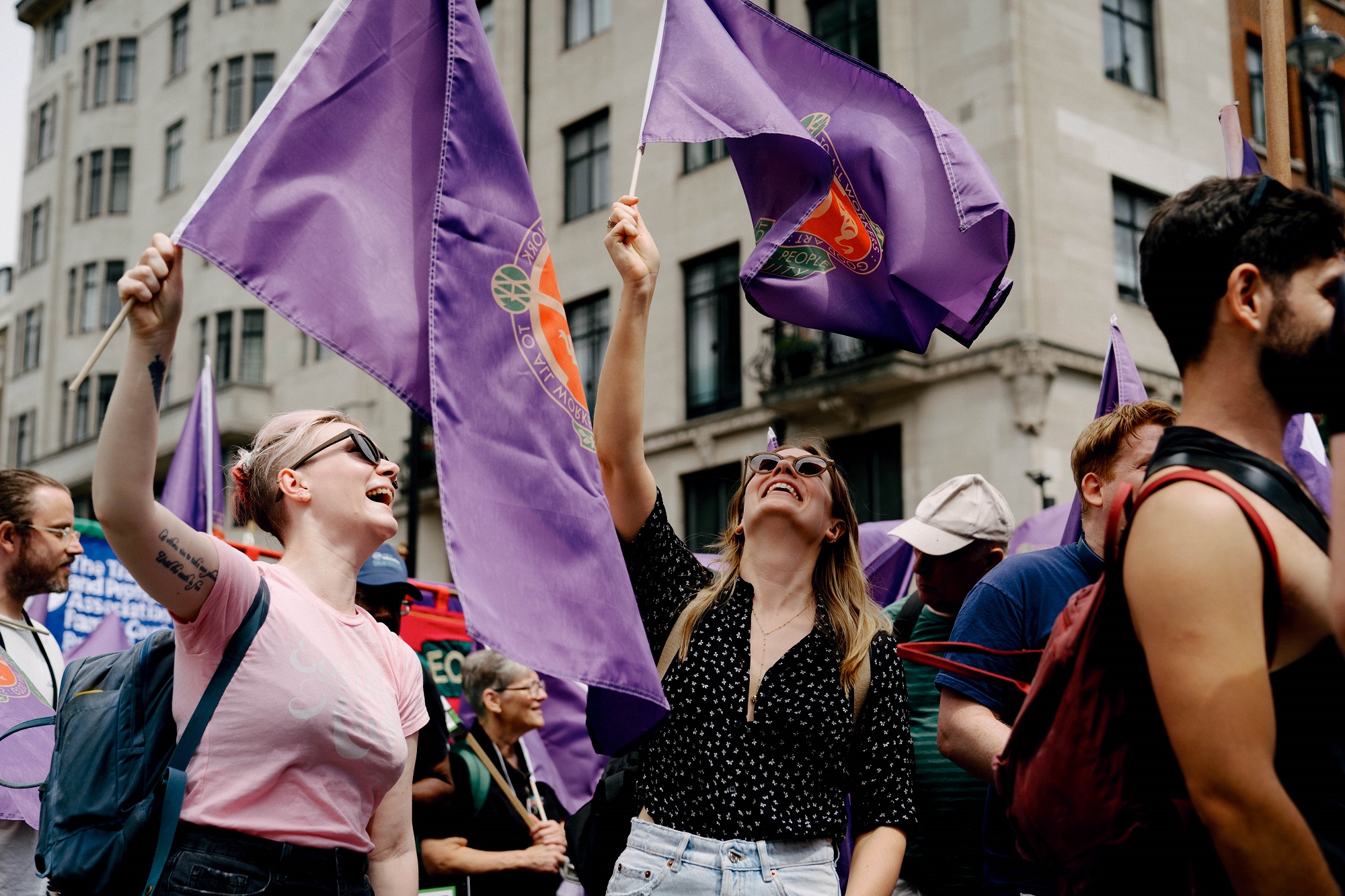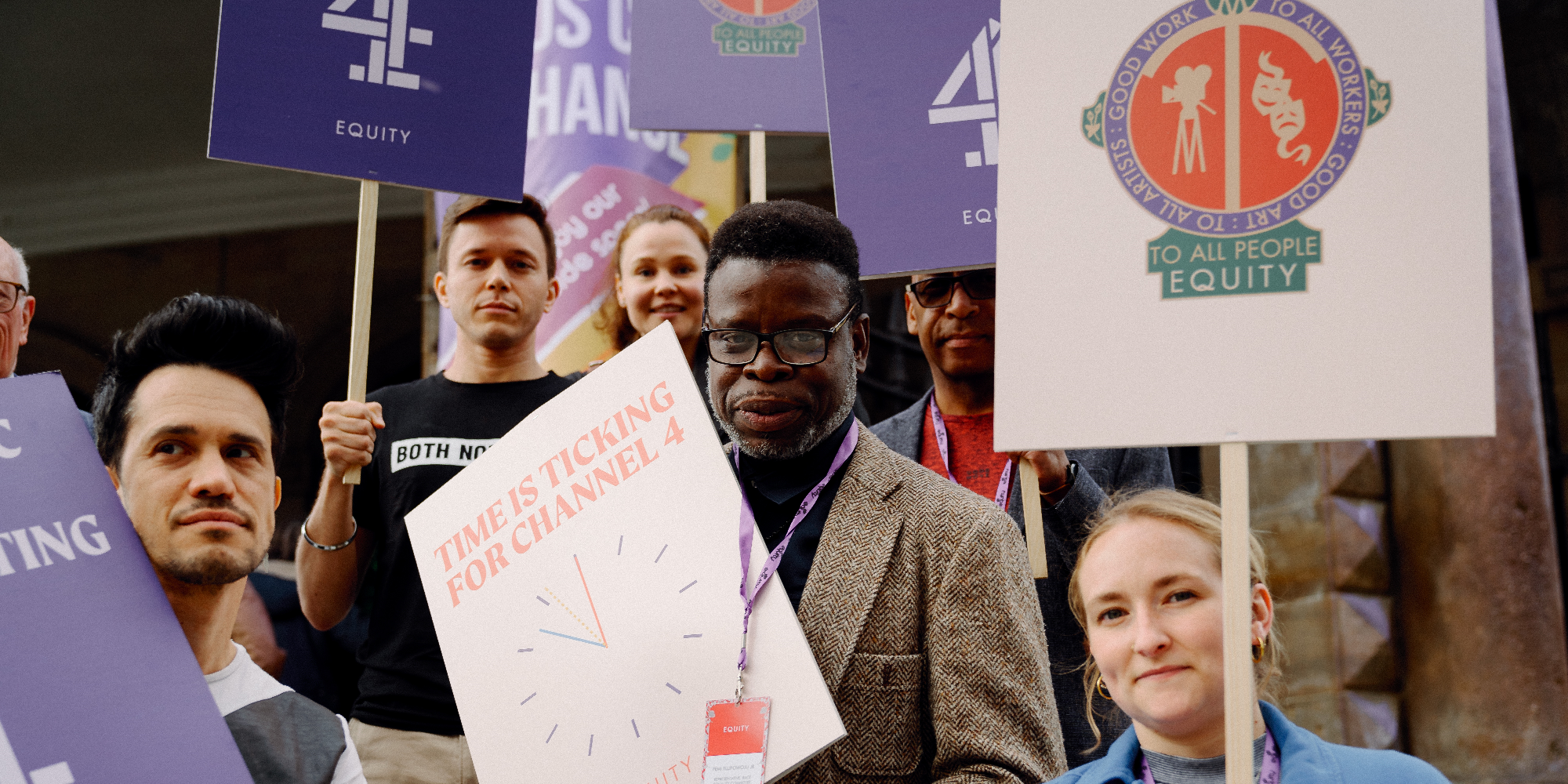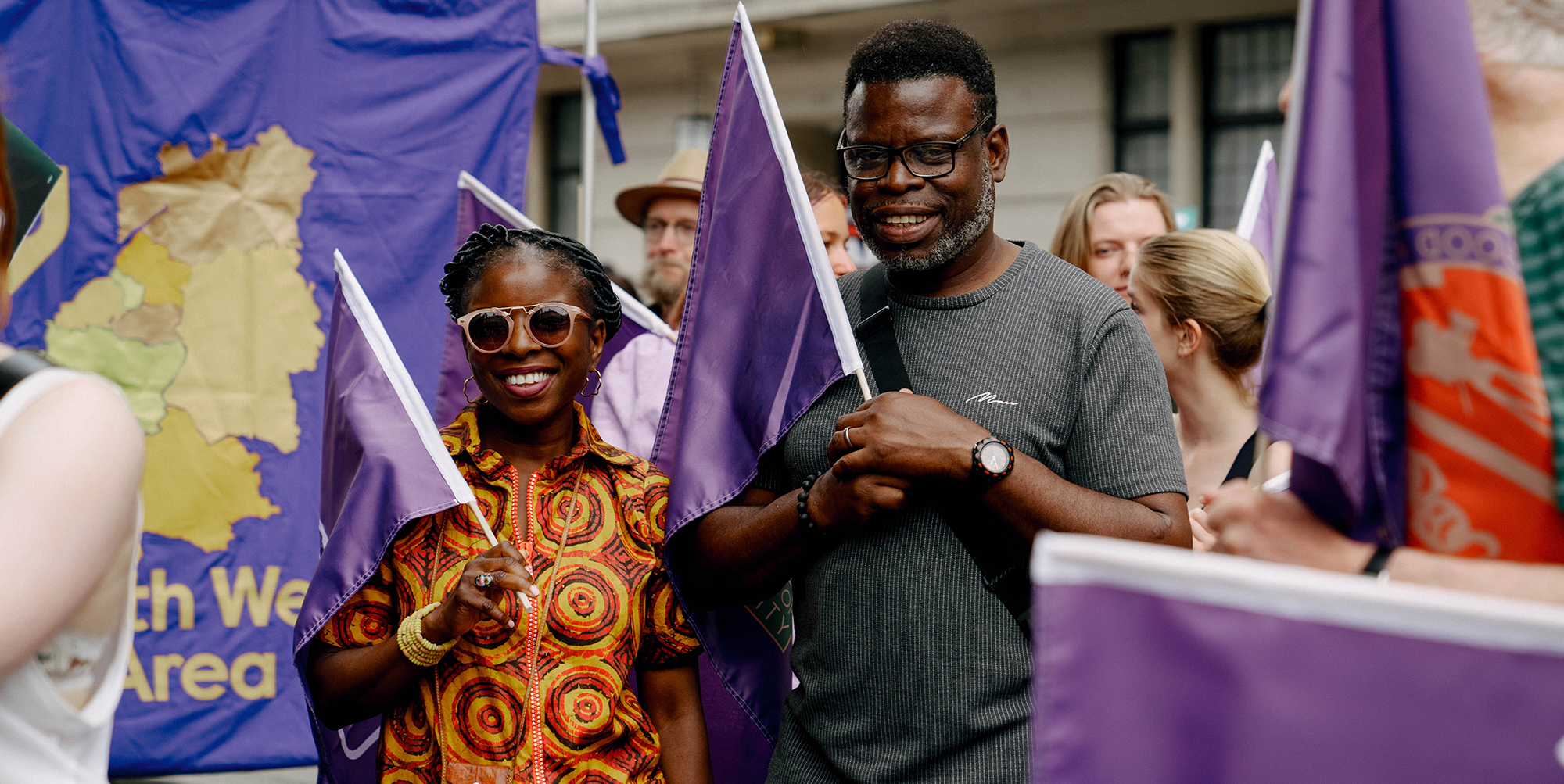Performing Arts for All
Equity’s manifesto for a thriving performing arts and entertainment industry.

Equity’s manifesto for a thriving performing arts and entertainment industry.
Summary of recommendations
1. Set out a roadmap to increase public funding for the performing arts and entertainment
to the European average of 0.5% of GDP over two parliamentary terms.
2. A living wage in the arts and entertainment
3. Regionalise arts and entertainment funding
4. Democratise arts decision-making
5. Regulate artificial intelligence to protect and reward human creativity
6. Build a diverse, inclusive and representative arts and entertainment industry
7. Expand public film and television
8. Invest in arts education and skills
The promise of the performing arts and entertainment
The performing arts and entertainment offer a unique, vital and intrinsic value to all societies, something irreplaceable. The enlightenment, entertainment and joy provided by creative expression is foundational to human experience.
The performing arts and entertainment do not merely supplement our material lives but run through our work and leisure, whether in music, art, photography, dance, theatre, TV, film or video games. They help us to understand and interpret the world around us, enriching our lives. That is why four in every five members of the public see the arts as important. While seven in ten of all adults spend time at an arts event or activity over a year.
These industries also have wider positive impacts, fostering local economic development, social inclusion, education and skills, tourism, physical and mental wellbeing, and strengthening the global reputation of the United Kingdom.
There is a wide body of evidence to demonstrate the vast, positive economic effects of UK arts and entertainment. A 2020 Arts Council England report found that the industry directly generated £28.3bn in turnover, £13.5bn in Gross Value Added, 190,000 full time equivalent jobs and £7.3bn in employee compensation in England. The report also detailed how the arts are highly productive; on average producing an annual Gross Value Added per full time worker of £69,000, compared to £57,000 for the non-financial UK economy as a whole. The Scottish Government also states that the wider Scottish creative industries employ 70,000 people, and contribute £5.5bn to the Scottish economy each year.
Performing Arts for All aims to build on these positives towards a thriving performing arts and entertainment industry. One which promotes secure, sustained and fulfilling careers for creative practitioners within an industry that serves a wide audience, realising its economic potential.

The challenges to the performing arts and entertainment
A long decline in funding
In the 1980’s the Secretary-General of the Arts Council, Roy Shaw, described the industry as “under-subsidised, under-patronised, undervalued and, if I may coin a word, under-distributed”. Since then, too little has changed.
The performing arts and entertainment industry remain in a deeply precarious state following deep and wide cuts to funding, and an inequitable distribution of remaining resources. Equity will always campaign against austerity policies that weaken both our arts and public services and diminish their vital role in society.
The loss of nearly €200m in European arts funding following our exit from the European Union and the impact of COVID-19 upon the industry have further exacerbated long-standing funding challenges and have made working in the industry increasingly difficult. According to our data, 40% of Equity members received no direct support from the government’s pandemic income support schemes, despite the Creative Industries Federation predicting a ‘devastating and irreversible’ loss of revenue and 400,000 jobs and labelling the pandemic ‘a cultural catastrophe’.
Local arts cuts have compounded the deterioration in national funding, as councils seek to balance tighter budgets by scaling back local arts and entertainment provision. House of Commons Library analysis shows that English local authorities have been forced to cut £987m in arts spending since 2009/10 (in 2021/22 prices). By 2018, local government arts funding was already down 43% from its 2008 peak, a funding picture that has since further deteriorated. This has frayed the patchwork of provision available to communities across the country. For example, Somerset Council cut all arts spending in 2010, Nottingham council stopped funding the Nottingham Playhouse in 2014, while Newcastle’s proposed 100% arts cut was fought by Equity members and reduced to 50%, with the Theatre Royal losing all funding.
Low pay and poor working conditions
Diminished funding exacerbates the insecurity and low wages of practitioners in the industry. According to Equity data, 94% of members earn less than the median full-time wage in the UK, with an average annual wage of £15,270 (after expenses, but before tax). Even in the most celebrated parts of our industry, such as London’s West End, nearly half of Equity members are forced to work a second job alongside performing.
Despite their huge economic, social and cultural contributions, too low a value is placed on creative practitioners by government and engagers in the industry. In April 2022, payrolled staff working in the arts, entertainment and recreation received the lowest pay increases of any sector in the past year, despite vacancies in the industry increasing by 370% . This is in the context of the spiraling price of essential goods, and a long fall in real value of wages.
While low pay is at the heart of practitioners’ precarity, it is compounded by longer working weeks and poor quality, unsafe accommodation on tour. Many have issues with career longevity, for example when those with caring responsibilities are excluded from the industry as a result of these working conditions.
Most are prevented from receiving basic support from our social security system by the Minimum Income Floor, as demonstrated by Equity’s report ‘Not Here to Help’ which analysed members’ experiences of social security.
Centralised, opaque and undemocratic arts governance
Arts funding decisions are highly centralised and lack transparency and accountability. In England, National Portfolio Organisation funding is published with little explanation or analysis. Major decisions, such as cutting all funding to a regional producing theatre, are not properly reasoned or explained. Governments in Wales, Scotland and Northern Ireland have recently announced cuts to overall arts budgets with little evidence or justification. This leaves little scope for scrutiny.
Practitioners perceive national funding criteria as narrow and discriminatory, blighted by elitist notions and bias. There is minimal scope for input on the part of those working in the arts and entertainment, or their trade union representatives. Criteria appear changeable, unclear, and very business focused. One applicant described communication during the application process to Equity as “uncommunicative, apathetic, inflexible and unhelpful. . . showing little concern for how their processes and behaviour affect the lives of the very artists they are being paid to support”.
English Arts funding continues to be spent disproportionately in London, which received £152m for this three-year funding round, a third of the annual budget. Arts Council England accepts that “some places our funding has been too low for too long.” But recent attempts to move organisations out of London have been approached symbolically, with incoherent plans that lack the proper focus on developing decent arts work outside of the capital.
Government emphasis on the role of philanthropy in supporting the performing arts is at odds with the reality that private funding will remain a small, unreliable and unaccountable portion of overall resource. Extended private influence over the performing arts could have worrying implications for the freedom of artistic choice, fostering censorship, or narrowing the stories that are told.
The erosion of British public television and film
Since 2010, domestic television and film production has been subject to significant reductions in support. The BBC has faced 30% real terms cuts to funding since 2010 , through a series of central government licence fee freezes and reductions in state support, such as to over-75s. Cumulatively, these changes have taken over £1.8bn a year from the BBC’s budget. Around £740m of this has come from cuts to content and the scope of services. This has resulted in thousands of job losses, and reduced news and investigative journalism at the Asian Network, local radio, coverage in Wales and Scotland, and radio drama and original drama on BBC 4. It also has knock-on consequences – we simply won’t have an independent producing sector without strong public sector broadcast providing infrastructure, from training to platforms and studios.
Cuts to the public service broadcast workforce - such as the recent attempts to close the BBC Singers, the UK’s only full-time chamber choir - have encouraged talent to leave, creating skills gaps, and reducing retention of those trained using public funds.
Film Tax Relief, which Equity has long campaigned in support of, has succeeded at fostering inward investment into the UK film and High-End Television industry, which reached record levels of spend over 2022 . Yet, three quarters of British film is financed by US companies, via a UK-registered entity. American companies have historically dominated production, distribution and exhibition in the ’British’ industry. Domestic UK films accounted for only 15% of HETV production and 8% of total spend on film production here in 2022, the latter was down a third from the previous year. This raises serious concerns about the sustainability of an industry so heavily reliant on inward investment.
British film and HETV is now in competition with a handful of global, vertically integrated companies. A recent report by the Writer’s Guild of America West showed how market power has become concentrated in Disney, Netflix and Amazon via mergers, acquisitions and the vertical integration of production and distribution. It argues that they are turning their streaming services into “a walled garden for self-produced content – a model built for and dependent on restricting the availability of independent content from competing producers, underpaying creators, and, above all, making future consolidation the name of the industry game”. Consolidation and intellectual property capture drive further reductions in the ongoing benefits of their inward investment to the UK economy and workforce.
Finally, the strong suggestions of government arms-length interference in the BBC, programmes of internal privatisation, and issues of accountability have driven a growing scepticism about the independence and quality of its journalism.
Artificial intelligence and technological change
The emergence of Artificial Intelligence (AI) within the performing arts and entertainment will offer some additional opportunities to the present and future workforce, but it is already displacing jobs and posing a challenge to performers’ intellectual property rights.
A survey of Equity members found that four out of five felt that they did not understand their rights in relation to AI before signing a contract. 65% of respondents thought the development of A.I. technology poses a threat to employment opportunities in the performing arts sector - this rose to 93% for audio artists whose livelihoods are already being affected by this technology.
Intellectual property and copyright infringement are old challenges, but take a new form in the context of AI innovations. Equity is not seeking to halt the advance of technological change, which the union has engaged with for a century, over the shifts from theatre to cinema to television and streaming. Instead, Equity seeks to ensure that the existing frameworks for resolving issues of intellectual property and copyright are applied to the contemporary context, to provide the proper rights and remuneration that the workforce deserve. We are also delivering benefits and protections through collective bargaining.
Inadequate representation, diversity and inclusion
The performing arts and entertainment industry still lack inclusive representation among practitioners and audiences. Abuses of power, and a sense of exclusion, operate in many parts of the country, particularly among the working class, women, disabled people and those from ethnically and culturally diverse backgrounds. One study found that the number of working-class actors, musicians and writers has shrunk by half since the 1970s, for example. Many young people are also deprived of contact with the arts through poverty, the failure of the education system, and discrimination in the profession.
Despite constituting nearly a fifth of the UK population, ethnic minority groups make up just 14% of the English arts and entertainment workforce, according to the Arts Council England. Only 10% of ACE Culture Recovery Funds went to Black, Asian and Diverse-led organisations. Analysis during the pandemic found that the number of BME women working in the UK arts and entertainment sector had fallen by 44% in a single year. In Scotland, nearly half of ethnic minority UK arts and entertainment continue to be disproportionately produced and consumed by white people, narrowing the scope of stories told.
Research by Parents and Carers in Performing Arts found that regular weekend and evening work, last-minute recruitment practices, long hours, touring and night work all made the performing arts inaccessible for those with caring responsibilities. This reduced the median earnings for those with caring responsibilities, and forced many to leave the industry or turn down work, driving deeper gender and class inequities across the sector.
These injustices have spurred social movements such as the ‘Me Too’ campaign, Black Lives Matter and trade union activism. Every person, whatever their age, ethnicity, gender or sexuality, class, ability or impairment, should feel able to engage with the performing arts and entertainment at all levels, as practitioner or audience.
Reduced access to education and training opportunities
Arts education has also suffered because of national policy shifts which undermine the sustainability of UK arts and entertainment. A Cultural Learning Alliance analysis showed that ever since 2010 there has been a 23% decline in hours of teaching of all arts subjects.
Alongside this, the high cost of tuition fees represents a huge additional burden on those working in an industry defined by low pay and precarity for the majority. In 2021/22 th government announced a 50% cut to per-student funding for creative and performing arts degrees.
Large-scale unemployment creates great pressure on Equity members. We cannot divorce important issues such as childcare, bullying and sexual harassment, discrimination and mental health from the fundamental living conditions of employed and unemployed practitioners in the arts industry. Conditions which are further exacerbated by a lack of social security protection, support for caring responsibilities and poor access to decent, affordable housing.

Eight steps to build a thriving performing arts and entertainment industry
To overcome these challenges, we need the government, employers and the trade unions to act to bring about change. Equity members will campaign to enhance employment, wages, conditions and well-being, and combat issues of sexism, racism and other forms of discrimination through the union’s collective agreements. But we also need policy change from the government if we are to build a thriving performing industry which provides performing arts for all.
Policymakers should commit to:
1. Set out a roadmap to increase public funding of the arts and entertainment to the European average of 0.5% of GDP
- The next government should set out a roadmap for bringing UK arts funding up to the European average of 0.5% of GDP, providing additional funding of £6.3bn a year (in 2022/23 prices) by the end of the period (plus Barnett consequentials).[1] We believe that this should be achieved over two parliamentary terms.
- This additional funding would also be sufficient to cover the policy proposals outlined (below) in Performing Arts for All, to take steps towards a properly resourced, public arts industry.
- It could be funded by equalising Capital Gains Tax rates with Income Tax, or applying National Insurance to all forms of income, each of which raise billions.
- Introduce longer-term grant allocations to enable secure planning across the whole range of companies.
- Maintain real expenditure on tax reliefs for theatre, film and video games, but ensure that any companies in receipt of public subsidy are engaged in collective bargaining and agreements (and respect their terms) as a condition of receipt of public subsidy.
2. A living income for arts workers
- Introduce a £15 per hour national minimum wage by the end of 2025.
- Require local authorities to insist upon payment of Equity rates to creative practitioners as a condition of granting licenses to performance venues.
- Introduce payment of Equity rates to creative practitioners as a condition of receipt of public funding.
- Abolish the Minimum Income Floor of Universal Credit, which acts as a barrier to performers seeking support in their time of need.
- Trial a basic income for arts workers, similar to the current trial ongoing in the Republic of Ireland, with a budget of £200m over 3 years.
3. Regionalise arts funding
- Local arts funding should be restored using £1bn of the uplift in national arts spending (proposed above). Government should commit to protecting local government arts budgets in real terms thereafter, and ring-fence some funding for council arts conferences, to involve the public in local programming.
- Alongside greater resource, the current funding model should be transformed into a federalised, regional structure. This should be composed of Regional Culture Councils who work in partnership directly with local government, practitioners and community representatives to make funding decisions independently of the national arts council. These bodies would be empowered with a facilitating (rather than gatekeeping) role in funding local arts.
- This is a vital step towards building a public model of socially and artistically beneficial provision which improves on the current business model of portfolio investment. Under a new regional, democratic structure of governing public funding, emphasis should be placed on expanding the ecology of independent sector productions, new, public regional theatres, small-scale touring companies and theatre-in-education companies, each creating work through engagement with local communities.
- This ambitious new funding model must seek to deliver a funded theatre venue in every major town across the UK.

4. Democratise arts decision-making
- Equity believes in an alternative arts funding model that is more inclusive of all participants – practitioners, peer groups and audiences – and responds to the interests and needs of communities across the country; increasing the amount, quality and range of work produced.
- Policymakers should widen participation in a new regional arts funding structure, through local arts advisory boards of practitioners and residents to engage with funding bodies and local authorities.
- Monitor and expand the employment of local performers and other creative staff in productions outside of London.
- Require ten-year, sector-specific funding strategies from arms-length funding bodies, determined through consultation with practitioners and communities. Prioritise strategies for the opera sector and dance.
- Request a detailed report on decision-making at each public funding round, alongside data of NPOs being funded.
5. Regulate artificial intelligence to protect and reward human creativity
- Update the Copyright, Design and Patents Act (1988) to cover ‘performance synthesisation’.
- Update the Copyright, Design and Patents Act (1988) to strengthen protections of image rights.
- Adopt the Beijing Treaty to provide creative practitioners with moral rights over their work.
6. Build a diverse, inclusive and representative arts and entertainment sector
- Introduce industry-wide regulation to reduce the working week to five days during rehearsals, to improve access for people with caring responsibilities, and provide reasonable leisure time.
- The Department for Culture, Media and Sport and the Arts Councils in England, Wales, Northern Ireland and Creative Scotland and should provide updated guidance on diversity and inclusivity to employers, agents and casting directors, and clearer guidance on expectations for NPOs. All funding organisations must request fully inclusive representation as a requirement of public funding.
- Establish a new £50m Graduate Arts Innovation Fund to provide seed funding for graduate arts productions with commercial potential.
- Provide greater subsidy for ticket prices, to widen arts access. The government could review VAT on theatre tickets, for example.
- Develop a specific strategy to foster the British Variety sector, including singers, comedians, circuses and drag artists.
- Develop a package of targeted measures to improve support and access to the industry for disabled workers, in direct consultation with disabled workers themselves and their trade unions.
- Publish a strategy to reach ‘arts and entertainment net zero’ in line with the government’s existing net zero timelines, building on Equity’s work with industry to adopt a Green Rider for creative practitioners.
7. Expand British public television and film
- Equity wishes to see a refounded BBC, with a new approach to universal, public broadcast. A new structure where the BBC is owned and run by both the licence fee payer and its workforce.
- Restore £1bn lost funding to the BBC, including expanding in-house facilities and investing in regional TV production.
- Reform governance of the BBC to include stronger representation of workers and viewers in decision-making.
- Establish a £500m fund to create a publicly owned and financed film producing sector through the BBC, S4C, C4 and BFI, with a long-term vision for production, distribution and exhibition of UK films.
- Make more historic BBC programming freely available through IPlayer.
- Restrict tax reliefs in the video games industry to those companies that can demonstrate they engage creative practitioners on trade union contractual agreements.
- Diversify the workforce and audience and expand training in technical skills and apprenticeships across television and film.
8. Invest in arts education and skills
- A £500m Arts Grants Fund to cover living expenses and special clothing and equipment costs, as well as ongoing training for young and established professionals.
- Establish arts mentoring and support networks in schools.
- Scrap EBacc and other constraints on arts subjects to increase arts education.
- Establish a £50m School Play Fund to support theatre visits in junior and secondary schools.
- Review the regulation of the arts training establishments to strengthen their responsibilities over bullying and sexual harassment.
Want to know more?
For more information, contact Tom Peters, Policy and Public Affairs Officer – tpeters@equity.org.uk
Email Tom Peters